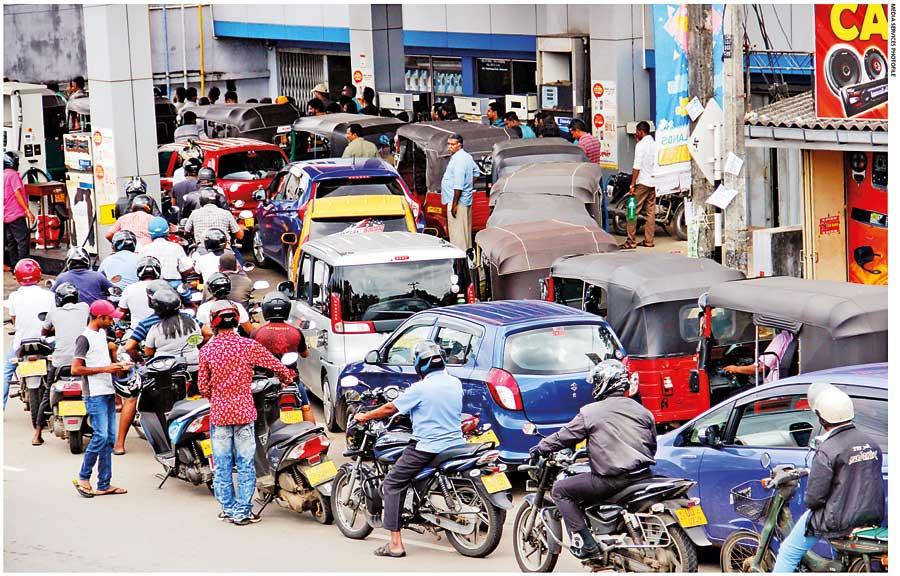Reply To:
Name - Reply Comment

- Ceypetco rejects allegations that its petrol is sub standard
- Motorists claim Ceypetco petrol does not give the usual milage
- CPC Chairman Sumith Wijesinghe denied all the statements made by the CPC union as well as the rumours spreading regarding the quality of the fuel standards
- When asked about the quality of the fuel stocks, Mr. Wijesinghe claimed that all allegations were false and there was no quality deducted from the fuel stocks
As the government struggles to meet the country’s fuel requirements, concerns among users of motor vehicles have grown over the quality of Sri Lanka’s existing fuel stocks. Unverified reports have circulated among social media users stating that the existing stocks of fuel are low in quality, adding that these were causing numerous problems to their motor vehicles.
stocks. Unverified reports have circulated among social media users stating that the existing stocks of fuel are low in quality, adding that these were causing numerous problems to their motor vehicles.
An independent and formal laboratory test should be conducted on the standard of the petrol stocks that were released to the market, Ceylon Petroleum Corporation’s (CPC) Jathika Sevaka Sangamaya wing (JSS) Secretary Ananda Palitha said.
He said various complaints had been received from consumers claiming that they were experiencing technical issues, especially with motor vehicles which have petrol engines, adding that they were unable to maintain the maximum mileage for the fuel stocks pumped into their vehicles.
People who use three-wheelers, motorcycles, and motor vehicles for their transport requirements on a daily basis have also made complaints in this regard. The most common complaint from these groups have been that they were unable to use their fuel stocks for their maximum mileage.
According to Mr. Palitha, the higher the octane number of fuel, the greater the efficiency would be. Fuel with a lower octane number, the lesser the efficiency.
“The octane 90 petrol was upgraded to octane 92 in 2012 to increase the efficiency and durability of vehicle engines while also providing a benefit for consumers’ pockets. It will help to reduce the usage of the engine parts and minimise the use of spare parts, “he said.
However, with the current petroleum stocks on the market, the aforementioned benefits are not reaching the people. They always claimed that their vehicles were difficult to start and even had engine knocking issues while driving with unusual sounds.
“Earlier, petrol and kerosene were released to the market with no colour. But certain filling stations used to mix petrol with kerosene to increase their sales. Therefore, the CPC had made a decision to change the colour of kerosene stocks to a light pink to identify whether the petrol was mixed with kerosene or not, “he said.
Although the concerns surrounding the quality of fuel in Sri Lanka has become a major discussion among the public, the CPC has not taken any decision to rectify the issue, despite receiving numerous complaints.
Mr. Palitha is of the view that the CPC would have been able to mitigate or prevent this issue, if raids were conducted in this regard with the help of their CPC’s internal investigation units. He claimed that the CPC had allowed for this kind of illegal activity to take place. He also warned that this would cause severe impact to the environmental sector. He also stressed that a large amount of foreign exchange is flowing to foreign countries to import spare parts, following the issues faced by motor vehicle users who use low quality fuel.
He also recalled that the CPC has once learned from their mistakes in 2012, when the company released contaminated fuel stocks and had to pay compensation for the damaged vehicles. Since the event, people are now suspicious of the purity of the fuel stocks issued by the CPC, he said. Therefore, the Jathika Sevaka Sangamaya urged the CPC to take actions to protect their reputation and to stop people from moving to other competitive oil distribution companies.
Fuel crisis due to mismanagement?
Moreover, Ananda Palitha said, due to mismanagement of stocking and ordering fuel stocks at Ceylon Petroleum Corporation, the country is now facing a considerable fuel shortage at CPC filling stations while the public is inconvenienced.
There are 1,350 CPC affiliated filling stations established across the country within a 3km distance of each filling station. “The fuel requirement of the country is 6,000 MT and the recently received 40,000 MT of fuel is sufficient only for eight days. If the next fuel shipment does not arrive within the next eight days, there will be a fuel scarcity in the country. However, the next shipment should arrive within the next three days to ensure smooth distribution of fuel in the country without any shortage,” he said.
According to Palitha, fuel distribution has been limited in the country. Certain filling stations have placed their orders and are waiting for two to three weeks to get their supplies.
However, the Lanka IOC provides continuous fuel supply for their 160 filling stations around the country, which leads CPC customers to get fuel from them.
LIOC meanwhile has sufficient fuel to run their distribution operations smoothly. But the CPC has no proper plan for importing fuel. As a result, the CPC does not have enough fuel to meet the filing stations’ needs, he explained. Palitha also said that there is a possibility of contaminated fuel being imported into the country.
No fuel shortage, quality not compromised: CPC Chairman
When contacted, CPC Chairman Sumith Wijesinghe denied all the statements made by the CPC union as well as the rumours spreading regarding the quality of the fuel standards.
He said there is no fuel shortage in the country and they are distributing the fuel stocks until the next shipment arrives. With the current international fuel prices, managing fuel stocks in the country is a major effort and should be admired, he said. “Another scheduled shipment of fuel will be received on February 19, 20, 22, and 23. Receiving the scheduled fuel stocks, will eventually help with electricity generation as well,” he said.
When asked about the quality of the fuel stocks, Mr. Wijesinghe claimed that all allegations were false and there was no quality deducted from the fuel stocks. “Certain groups had tried to spread rumours but failed. The auto diesel stocks that we imported are of higher quality than the existing stocks.”
He also said CPC consumers who have been directed to refuel from Lanka IOC is in fact supportive towards the CPC. Explaining further, Mr. Wijesinghe said while the CPC is running operations at a loss, as a result of the global fuel price hike, LIOC too is running at a loss. “Therefore, there is no foreign currency outflow at all, as there are no profits to be made. I wholeheartedly agreed with those who relied on LIOC refuelling stations to meet their needs.”
Finally, he said that CPC has once again requested the subject minister to give the go-ahead to increase fuel prices in the near future. He was of the opinion that local fuel prices need to increase against the backdrop of rising crude oil prices in the world market. Therefore, the CPC has briefed Energy Minister Udaya Gammanpila again about the matter while submitting the price revisions it is seeking.